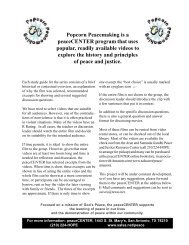LEO TOLSTOY Eleven Stories
LEO TOLSTOY Eleven Stories
LEO TOLSTOY Eleven Stories
You also want an ePaper? Increase the reach of your titles
YUMPU automatically turns print PDFs into web optimized ePapers that Google loves.
him. His life became peaceful and joyful. He sat down<br />
to his work in the morning, and when he had finished<br />
his day’s work he took the lamp down from the wall,<br />
stood it on the table, fetched his book from the shelf,<br />
opened it, and sat down to read. The more he read the<br />
better he understood, and the clearer and happier he<br />
felt in his mind.<br />
It happened once that Martin sat up late,<br />
absorbed in his book. He was reading Luke’s Gospel;<br />
and in the sixth chapter he came upon the verses:<br />
‘To him that smiteth thee on the one cheek<br />
offer also the other; and from him that taketh away thy<br />
cloke withhold not thy coat also. Give to every man that<br />
asketh thee; and of him that taketh away thy goods ask<br />
them not again. And as ye would that men should do<br />
to you, do ye also to them likewise.’<br />
He also read the verses where our Lord says:<br />
‘And why call ye me, Lord, Lord, and do not<br />
the things which I say? Whosoever cometh to me, and<br />
heareth my sayings, and doeth them, I will shew you to<br />
whom he is like: He is like a man which built an house,<br />
and digged deep, and laid the foundation on a rock: and<br />
when the flood arose, the stream beat vehemently upon<br />
that house, and could not shake it: for it was founded<br />
upon a rock. But he that heareth and doeth not, is like a<br />
man that without a foundation built an house upon the<br />
earth, against which the stream did beat vehemently,<br />
and immediately it fell; and the ruin of that house was<br />
great.’<br />
When Martin read these words his soul was<br />
glad within him. He took off his spectacles and laid<br />
them on the book, and leaning his elbows on the table<br />
pondered over what he had read. He tried his own life<br />
by the standard of those words, asking himself:<br />
‘Is my house built on the rock, or on sand? If it<br />
stands on the rock, it is well. It seems easy enough while<br />
one sits here alone, and one thinks one has done all<br />
that God commands; but as soon as I cease to be on my<br />
guard, I sin again. Still I will persevere. It brings such<br />
joy. Help me, O Lord!’<br />
He thought all this, and was about to go to bed,<br />
but was loth to leave his book. So he went on reading<br />
the seventh chapter -- about the centurion, the widow’s<br />
son, and the answer to John’s disciples -- and he came<br />
to the part where a rich Pharisee invited the Lord to his<br />
house; and he read how the woman who was a sinner,<br />
anointed his feet and washed them with her tears, and<br />
24<br />
how he justified her. Coming to the forty-fourth verse,<br />
he read:<br />
‘And turning to the woman, he said unto Simon,<br />
Seest thou this woman? I entered into thine house thou<br />
gavest me no water for my feet: but she hath wetted my<br />
feet with her tears, and wiped them with her hair. Thou<br />
gavest me no kiss; but she, since the time I came in,<br />
hath not ceased to kiss my feet. My head with oil thou<br />
didst not anoint: but she hath anointed my feet with<br />
ointment.’<br />
He read these verses and thought: ‘He gave no<br />
water for his feet, gave no kiss, his head with oil he<br />
did not anoint. . . .’ And Martin took off his spectacles<br />
once more, laid them on his book, and pondered.<br />
‘He must have been like me, that Pharisee. He<br />
too thought only of himself -- how to get a cup of tea,<br />
how to keep warm and comfortable; never a thought of<br />
his guest. He took care of himself, but for his guest he<br />
cared nothing at all. Yet who was the guest? The Lord<br />
himself! If he came to me, should I behave like that?’<br />
Then Martin laid his head upon both his arms<br />
and, before he was aware of it, he fell asleep.<br />
‘Martin!’ he suddenly heard a voice, as if some<br />
one had breathed the word above his ear.<br />
He started from his sleep. ‘Who’s there?’ he<br />
asked.<br />
He turned round and looked at the door; no<br />
one was there. He called again. Then he heard quite<br />
distinctly: ‘Martin, Martin! Look out into the street tomorrow,<br />
for I shall come.’<br />
Martin roused himself, rose from his chair and<br />
rubbed his eyes, but did not know whether he had<br />
heard these words in a dream or awake. He put out the<br />
lamp and lay down to sleep.<br />
Next morning he rose before daylight, and after<br />
saying his prayers he lit the fire and prepared his cabbage<br />
soup and buckwheat porridge. Then he lit the samovár,<br />
put on his apron, and sat down by the window to his<br />
work. As he sat working Martin thought over what had<br />
happened the night before. At times it seemed to him<br />
like a dream, and at times he thought that he had really<br />
heard the voice. ‘Such things have happened before<br />
now,’ thought he.<br />
So he sat by the window, looking out into the<br />
street more than he worked, and whenever any one<br />
passed in unfamiliar boots he would stoop and look<br />
up, so as to see not the feet only but the face of the<br />
passer-by as well. A house-porter passed in new felt





